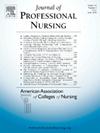Incorporating value-informed advanced nursing practice into APRN education
IF 2.8
3区 医学
Q1 NURSING
引用次数: 0
Abstract
Value-informed advanced practice nursing capitalizes on the high-value nursing model of care to meet population health needs and address rising healthcare costs. However, nurse practitioners (NPs) often lack knowledge about value-based care, which limits their ability to lead systems-based changes to improve outcomes and lower costs. Identifying the key domains for value-informed advanced nursing practice can support curricular alignment with competency-based education. A review of the peer-reviewed and gray literature identified an initial list of domains that impact the success of value-based NP care. These domains were then confirmed and validated through interviews with eight NP practice owners. The final seven key domains of value-informed advanced nursing practice – Leadership/High Value Culture, Quality and Analytics, Care Coordination, Collaboration and Community Connections, Financial Management, Care Redesign, and IT Infrastructure and Interoperability – align with the sub-competencies established by the American Association of Colleges of Nursing and the National Organization of Nurse Practitioner Faculty. Learning activities are offered to facilitate NP understanding of value-informed nursing practice and meet selected sub-competencies. Incorporating the key domains for value-informed advanced nursing practice into NP and Doctor of Nursing Practice education prepares emerging and seasoned NPs to lead systems-level change and improve care delivery.
求助全文
约1分钟内获得全文
求助全文
来源期刊
CiteScore
4.80
自引率
8.00%
发文量
153
审稿时长
52 days
期刊介绍:
The Journal will accept articles that focus on baccalaureate and higher degree nursing education, educational research, policy related to education, and education and practice partnerships. Reports of original work, research, reviews, insightful descriptions, and policy papers focusing on baccalaureate and graduate nursing education will be published.

 求助内容:
求助内容: 应助结果提醒方式:
应助结果提醒方式:


